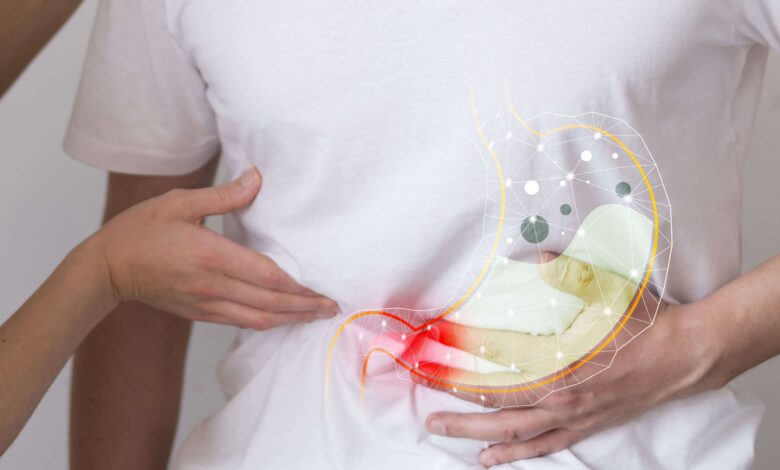
Stomach cancer, also known as gastric cancer, is a serious condition that originates from the cells lining the stomach. It can affect any part of the stomach, but most cases occur in the main body of the stomach. Let’s delve into the details of stomach cancer, including its symptoms, causes, and available treatments.
Symptoms of Stomach Cancer
Early-stage stomach cancer often doesn’t present noticeable symptoms. However, as the disease progresses, the following signs may emerge:
- Trouble Swallowing: Difficulty swallowing (dysphagia) can occur due to narrowing of the esophagus or pressure from the tumor.
- Belly Pain: Persistent abdominal discomfort or pain, especially after eating.
- Feeling Bloated: A sensation of fullness or bloating after consuming even small amounts of food.
- Heartburn and Indigestion: Chronic heartburn and indigestion may be early warning signs.
- Nausea and Vomiting: Frequent nausea and vomiting, especially after meals.
- Unexplained Weight Loss: Losing weight unintentionally without changes in diet or physical activity.
- Fatigue: Feeling extremely tired despite adequate rest.
- Black Stools: Dark, tarry stools due to bleeding in the stomach.
Remember that symptoms may not manifest until the cancer reaches an advanced stage. In later stages, additional symptoms may include vomiting blood and severe fatigue.
Risk Factors and Causes
Several factors contribute to stomach cancer:
- Genetic Changes: Cancer often results from genetic alterations leading to continuous cell division.
- Gastroesophageal Reflux Disease (GERD): Chronic acid reflux or backflow of stomach contents into the esophagus.
- Family History: A family history of stomach cancer increases the risk.
- Smoking: Tobacco use is strongly associated with stomach cancer.
- Obesity: Excess body weight is a risk factor.
- Dietary Factors: Low fruit and vegetable intake, high salt consumption, and contaminated food.
- Helicobacter pylori Infection: A bacterial infection linked to stomach ulcers and cancer.
- Benign Stomach Tumors: Certain non-cancerous growths may increase the risk.
- Vitamin B12 Deficiency: Poor absorption of vitamin B12 due to stomach issues.
- Alcohol Consumption: Excessive alcohol intake is a risk factor.
Diagnosis and Treatment
Healthcare providers consider various factors when planning treatment:
- Diagnostic Tests:
- Blood Tests: To check for anemia and infections.
- Endoscopy: A thin tube with a camera examines the stomach lining.
- Barium Swallow: X-rays after swallowing barium liquid to detect stomach abnormalities.
- Biopsy: A small tissue sample is examined under a microscope to determine cancer type and severity.
- Abdominal Imaging: To assess cancer spread.
- Treatment Options:
- Surgery: Removal of the cancerous part of the stomach.
- Chemotherapy: Medications to kill cancer cells.
- Radiation Therapy: High-energy rays target cancer cells.
- Immunotherapy: Uses antibodies to identify and destroy cancer cells.
- Lifestyle Measures:
- Regular exercise.
- Balanced diet with fruits and vegetables.
- Avoiding smoking and excessive salt intake.
- Maintaining a healthy weight.
- Treating stomach inflammation.
- Limiting aspirin and nonsteroidal anti-inflammatory drugs (NSAIDs).
Remember that early detection improves treatment success. If you experience persistent symptoms, consult a healthcare professional promptly.



